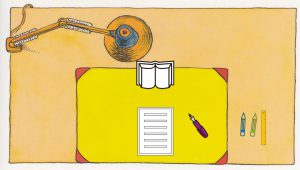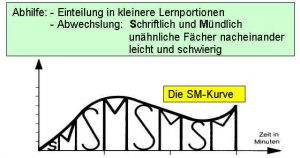English – Learning Tips
Learning how to study
Being a student at Maxgymnasium
as a student at a German secondary school of the type “Gymnasium“ you are expected to be able to organize yourself quite independently
this includes packing your school bag, doing your homework, preparing for lessons and studying for exams
you are supposed to be able to learn new things without (much) help
General rules
we are creatures of habit; try to find a routine that works for you and stick to it
with time, this routine will become “normal“ and easy for you
Your desk
- you should only work at your desk (creature of habit!)
- you should only use your desk for work (this helps getting you into the mood for work)
- your desk should only contain what you need for your current task
- make sure you have enough light; if right-handed, position a lamp on the left so your hand doesn´t throw shadow on your texts

Your attitude
- as a student, doing homework and studying is your job
- while of course school isn´t the only important thing in your life, it is one of the most important things
- make sure you have taken care of your school duties before doing other (fun) activities
you still need to have enough time to have fun, meet friends, do hobbies
Your planning
- have a written overview of your weekly activities; this lets you see when you actually have time to do school work and time for fun things
- have a written schedule of upcoming exams so you know when to start studying and revising more
- do not do too much in one go but create smaller units of regular activities
Your homework
- wait about 30 minutes between lunch and starting homework
- work out which homework you need to do for the next day
- prepare the material you need for this
- as in sports, start with something easy as a warm-up, put the most difficult task in the middle and finish with something quite easy
- alternate between written and oral tasks; e.g. English workbook, then English vocabulary
after 20 minutes of work take a 5 minute break; use a kitchen timer if you want

Learning words
- many students only “learn“ words that go into short-term memory, so they don´t know the words the next day
- the actual learning process means finding an explanation for yourself why the unknown word (e.g. English) and the known word (German) belong together
- it is perfectly OK if you are the only one who find this “explanation“ logical
Your vocabulary – Preparation
- use small index cards or cut a piece of paper into smaller slips
- write down the new vocabulary on a slip of paper each (unknown word on the front, known word on the back)
- mix them up (never leave them in the order they were in in your book)
make piles of 7 slips of paper
Your vocabulary – Learning
- read the unknown word aloud, then check the known word; use a recording device and record your saying all the vocabulary
- see if an immediate connection happens (e.g. because you already know the word family, because it is similar in another language, because you have heard it in a song)
if not, make up a reason why these two words belong together - pick 7 locations in your room; the locations always stay the same (e.g. your desk lamp, your chair, a flower pot,…)
- place one slip of paper at each location while reading both the unknown and the known word
- then step back and repeat which word was at location 1, location 2, location 3,…
just before going to bed, listen to the recorded vocabulary
This sounds like a lot of work, but if you follow these tips, learning new words should become a lot easier for you. You should not have to spend so much time revising old vocabulary because you already know it.
May you do well!
